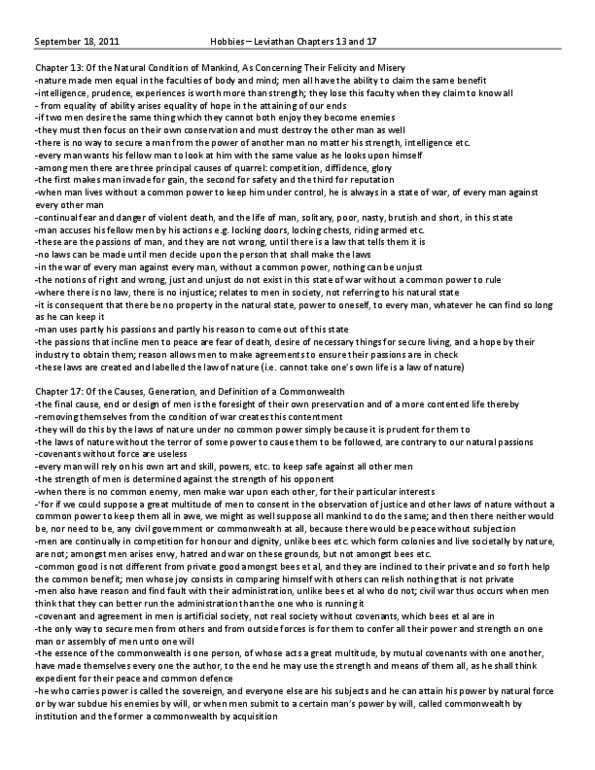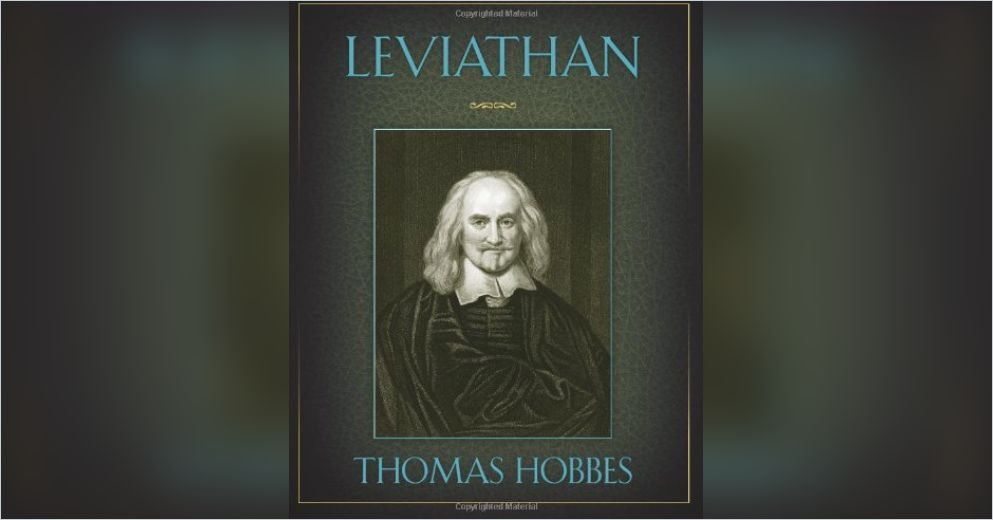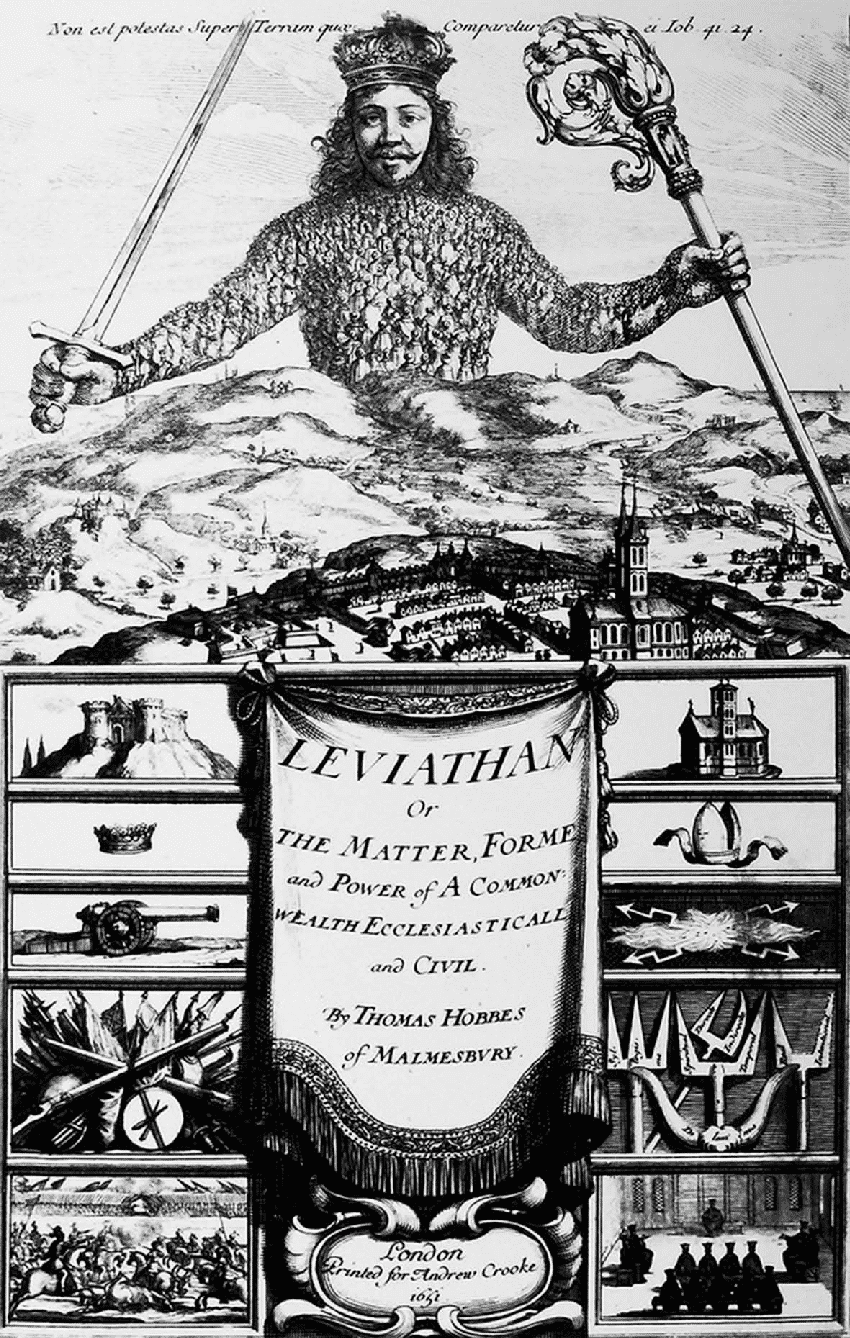Hobbes Leviathan Chapter 13 Summary
Hobbes Leviathan Chapter 13 Summary - Of the vertues commonly called intellectual: He conceived of the work. But in an inclination thereto of many dayes together: Web need help with chapter 8: Web without peace, he observed, humans live in “continual fear, and danger of violent death,” and what life they have is “solitary, poor, nasty, brutish, and short” (leviathan, chapter xiii). N ature hath made men so equal in the faculties of the body and mind, as that, though there be found one man sometimes. The most important intellectual virtue, according to thomas hobbes, is wit, which he defines as an ability to think quic. Web a summary of book i: Without which covenants are in vain, and but empty words; Web in explaining why a sovereign is not subject to his or her own civil laws, hobbes writes, “because it setteth the laws above the sovereign, setteth also a judge above him, and a power to punish him;
Hobbes's ideal commonwealth is ruled by. Chapter 14 summary & analysis next chapter 15 themes and colors key summary analysis it is the right of every human being in nature to use one’s own power as they see fit to preserve one’s. People are all created biologically equal, though some may be stronger or smarter than others. Chapter 11 examines human behavior as it relates to others, and raises two core ideas of leviathan. Web read chapters 13, 14, and 15 from hobbes' leviathan. Web need help with chapter 8: Hobbes saw the purpose of the leviathan as explaining the concepts of man and citizenship; That men perform their covenants made; Hobbes discusses people's option to live in misery or happiness. But in the known disposition.
Web chapter xv of other laws of nature from that law of nature by which we are obliged to transfer to another such rights as, being retained, hinder the peace of mankind, there followeth a third; Web need help with chapter 8: He conceived of the work. Web part 1 chapter 13 summary and analysis. But in the known disposition. Web 12 rows read more. Hobbes finds that life before a social contract is inherently. Web in explaining why a sovereign is not subject to his or her own civil laws, hobbes writes, “because it setteth the laws above the sovereign, setteth also a judge above him, and a power to punish him; In the previous chapters, hobbes has laid out a general case for how humans come to live in society, namely, that they are driven to it by fear. Without which covenants are in vain, and but empty words;
Hobbes Leviathan Chapter 17 Summary IngridEkanshi
Web in explaining why a sovereign is not subject to his or her own civil laws, hobbes writes, “because it setteth the laws above the sovereign, setteth also a judge above him, and a power to punish him; In the previous chapters, hobbes has laid out a general case for how humans come to live in society, namely, that they.
Hobbes Leviathan Chapter 21 Summary AhsenMuhannad
Web summary full work summary leviathan rigorously argues that civil peace and social unity are best achieved by the establishment of a commonwealth through social contract. He describes what people are like in the absence of authority, especially government authority. Web the leviathan is the king over the proud, it needs to control our personal greed. Learn exactly what happened.
Hobbes' Leviathan Part I YouTube
Hobbes's ideal commonwealth is ruled by. Perfect for acing essays, tests, and. So the nature of war, consisteth not in actuall fighting; Chapter 11 examines human behavior as it relates to others, and raises two core ideas of leviathan. Perfect for acing essays, tests, and.
Hello ) leviathan sparknotes
N ature hath made men so equal in the faculties of the body and mind, as that, though there be found one man sometimes. Perfect for acing essays, tests, and. The most important intellectual virtue, according to thomas hobbes, is wit, which he defines as an ability to think quic. Of the natural condition of mankind as concerning their felicity.
On "Leviathan", by Thomas Hobbes of Malmesbury (Part 1 On Man)
In order to have a more thorough picture of how society comes about, hobbes directs his attention to human nature, so that we can precisely understand how humans go from this state of nature. So the nature of war, consisteth not in actuall fighting; Web in explaining why a sovereign is not subject to his or her own civil laws,.
Leviathan by Thomas Hobbes Brief Summary YouTube
What hobbes calls the “laws of. Learn exactly what happened in this chapter, scene, or section of leviathan and what it means. Web in explaining why a sovereign is not subject to his or her own civil laws, hobbes writes, “because it setteth the laws above the sovereign, setteth also a judge above him, and a power to punish him;.
Leviathan Free Summary by Thomas Hobbes
He conceived of the work. Chapter 11 examines human behavior as it relates to others, and raises two core ideas of leviathan. N ature hath made men so equal in the faculties of the body and mind, as that, though there be found one man sometimes. Web without peace, he observed, humans live in “continual fear, and danger of violent.
Leviathan 13/14 Thomas Hobbes YouTube
Perfect for acing essays, tests, and. Without which covenants are in vain, and but empty words; So the nature of war, consisteth not in actuall fighting; He describes what people are like in the absence of authority, especially government authority. Learn exactly what happened in this chapter, scene, or section of leviathan and what it means.
Leviathan by Thomas Hobbes download the free PDF ebook
Of man of thomas hobbes's philosophical text leviathan. The most important intellectual virtue, according to thomas hobbes, is wit, which he defines as an ability to think quic. Web read chapters 13, 14, and 15 from hobbes' leviathan. Web chapter xv of other laws of nature from that law of nature by which we are obliged to transfer to another.
Hello ) leviathan sparknotes
The most important intellectual virtue, according to thomas hobbes, is wit, which he defines as an ability to think quic. And their contrary defects in thomas hobbes's leviathan? Hobbes discusses people's option to live in misery or happiness. Web read chapters 13, 14, and 15 from hobbes' leviathan. But in an inclination thereto of many dayes together:
That Men Perform Their Covenants Made;
Web the leviathan is the king over the proud, it needs to control our personal greed. Hobbes discusses people's option to live in misery or happiness. Chapter 14 summary & analysis next chapter 15 themes and colors key summary analysis it is the right of every human being in nature to use one’s own power as they see fit to preserve one’s. Web summary full work summary leviathan rigorously argues that civil peace and social unity are best achieved by the establishment of a commonwealth through social contract.
Hobbes Saw The Purpose Of The Leviathan As Explaining The Concepts Of Man And Citizenship;
Without which covenants are in vain, and but empty words; But in the known disposition. Web a summary of book i: In the previous chapters, hobbes has laid out a general case for how humans come to live in society, namely, that they are driven to it by fear.
Hobbes Finds That Life Before A Social Contract Is Inherently.
Learn exactly what happened in this chapter, scene, or section of leviathan and what it means. Web a summary of book i: Web read chapters 13, 14, and 15 from hobbes' leviathan. Web 12 rows read more.
N Ature Hath Made Men So Equal In The Faculties Of The Body And Mind, As That, Though There Be Found One Man Sometimes.
But in an inclination thereto of many dayes together: He describes what people are like in the absence of authority, especially government authority. Of the vertues commonly called intellectual: Web in explaining why a sovereign is not subject to his or her own civil laws, hobbes writes, “because it setteth the laws above the sovereign, setteth also a judge above him, and a power to punish him;









